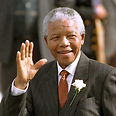
Nelson 'Joseph' Mandela
Like biblical figure, former South African president recognized opportunity that had been presented to him and his country to become model on how to behave and react nobly to injustice
Joseph was sold into slavery to Egypt by his brothers, jailed for 12 years along the way, and when released was made viceroy of Egypt. In the Torah portion read the week Mandela died, we pick up the story when Joseph reveals his identity to his brothers and repays them with kindness despite the fact that years earlier they had sold him into slavery.
The similarities between the life of biblical Joseph and Nelson Mandela are remarkable. The most moving part of the story is when Joseph asks his brothers to draw close to him and tells them, "I am your brother Joseph, whom you sold into Egypt. But now do not be sad, and let it not trouble you that you sold me here, for it was to preserve life that God sent me before you. For already two years of famine have passed in the land, and for another five years, there will be neither plowing nor harvest. And God sent me ahead of you to allow you to survive in the land and to keep you alive in a wonderful way.”
In other words, Joseph was saying that it was all part of God’s plan that he should become a viceroy in Egypt, so that when the famine struck the land of Canaan, there would be someone who could save them by providing them with sustenance. Nonetheless, the very act of selling Joseph into slavery was evil. The fact that in hindsight one was able to see the hand of God at work, makes it no less evil. Yet, this story is a prototype of how one should react when subjected to injustice at the hands of others.
Understood his place in history
There are always two actors when it comes to injustice. There’s the one inflicting the act and then there’s the recipient. The person who perpetrates injustice must never and can never see themselves as acting on behalf of God, and thus legitimizing their treacherous behavior. With injustice there is always evil. The Torah is very clear about that on numerous occasions. Yet the victim of injustice has a choice. They can either see themselves as victims and become full of hatred toward their oppressor or, alternatively, they can see what Joseph did.
Despite the fact that Joseph spent many years in jail because of the unjust and evil behavior of his brothers, he was able to see the curve of history and recognize that it pointed towards justice. Thus, from his own perspective, it wasn’t his brothers who acted treacherously, but rather it was God who had planned it all along and for a very good and noble cause.
Like Joseph, Nelson Mandela was a man who understood his place in history. He realized that he had a choice. He could have been bitter and do upon the white people of South Africa as had been done to him and his people, and once given the chance, he could have sought vengeance. He also could have recognized the opportunity that had been presented to him and his country to become a model on how to behave and react nobly to injustice.
Like Joseph in the Bible, Nelson Mandela chose the latter option. As a result, we have one more example, one more story, and one more remarkable individual that we can point to and say that, no matter how much we suffer, how much injustice we endure, we have a choice in how we react.
We can hold up Joseph from the Bible and Nelson Mandela from South Africa as examples of the correct way to react to the suffering brought by injustice. In this Nelson Mandela lives on.
Rabbi Levi Brackman is co-founder and executive director of Youth Directions, a non-profit organization that helps youth find and succeed at their unique positive purpose in life










